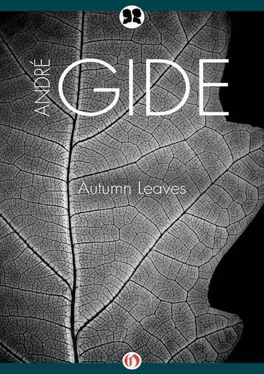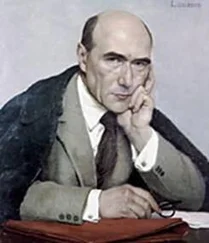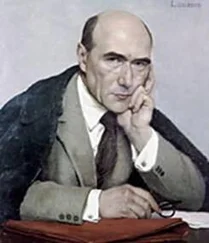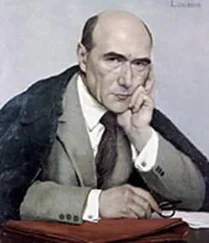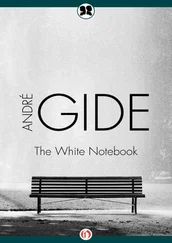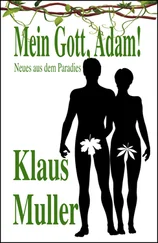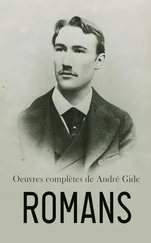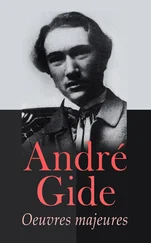ALTHOUGH I collaborated unremittingly with the Revue Blanche (where for a long time the writing of book reports fell to me), I never mingled much with the group of its colleagues and am sorry to-day to have only caught glances of various remarkable personalities among them. There is doubtless not a single painter, or writer of real value, recognized to-day, who does not owe the brothers Natanson and Félix Fénéon, unerring and subtle pilot of the ship, an ample tribute of gratitude. The Revue Blanche quickly became, if I may say so paradoxically, a rallying point for divergences, where all the innovators, those unsubmissive to the stereotyped, to academics, to the restraints of outworn orthodoxies, were assured of finding a warm welcome. And not only a welcome. The Revue took it upon itself to sustain them to defend them against the attacks of scandalized Philistines, and slowly, tenaciously, to impose them on the attention and consideration of the public. Whence its extraordinary importance in the literary and artistic history of our times.
But as far as I know, there was not, strictly speaking, any salon of the Revue Blanche, where its collaborators were assured of meeting each other weekly as those of the Mercure, around Vallette and Rachilde. Simple offices, a sort of editor’s room, where every day and at any hour, all meetings were possible. And that is how, one evening, as I was going to carry my copy to the editor’s office, I passed Valloton to whom Thadée introduced me. He was only passing by, too. The Mercure had just published Livre des Masques in which Remy de Gourmont had grouped his presentations of the most noteworthy authors of the period; and each one was preceded by a wood engraving done by Valloton. The scrupulous and worthy Swiss painter, not always being able to refer to the model, was sometimes inspired by photographs (as in my case). Before holding out his hand to me, he considered me for a few minutes, then: “Heavens, my dear Gide, I would never have recognized you from my portrait.”
And then Toulouse-Lautrec, Vuillard, Bonnard, Roussel, among the painters, and among the men of letters, Mirabeau, Madrus, Paul Adam, Jarry, Charles-Louis Philippe and so many others still who were discovered, launched, protected and sustained by Fénéon, I met elsewhere.
Even of Fénéon, there is nothing left for me to say, after the masterly portrait that Jean Paulhan recently traced of him.
Of the brothers Natanson, Thadée is the one I knew best; that is to say, a little less accidentally and fleetingly than his elder brother, Alexandre, or the middle one, Alfred; but the thick beard he wore, like Tristan Bernard, put up a screen against the effusions that the smiling amenity of his face would have invited. I doubt if that beard did not half conceal a simple kindness. Nevertheless, he was sensitive to everything, curious about everything, prepared for the echo, hearing nothing with indifference. Equally in love with letters and art, admirably trained by Fénéon and by his natural instinct, his mind and heart open to all generous causes. The Revue Blanche, at his invitation or following him, willingly “took its stand,” as one says to-day. Without being exactly a partisan, it easily took on a reddish tint, and its collaborators often assumed leadership.
Courageous Revue Blanche! How we need you to-day!
October 1946
FOR a long time I have wished to pay a little of my debt to Goethe. I could not find a better occasion than this anniversary. 1Goethe’s name has often dropped from my pen; but until now I have never spoken directly of that genius to whom I doubtless owe more than to any other, perhaps even than to all the others together. Yes, indeed, on speaking of him, it seems to me that to-day I am paying a debt.
I had the good fortune to meet Goethe early in life. I felt at once weaving, as though in spite of me, the bonds of a profound fraternity; and, however far from him mystical digressions have sometimes carried me, it is always with a deep satisfaction in my whole being that I let myself return to him.
I do not propose to set forth here any new aspects of his work or life. I am not so presumptuous and I think I am rendering him greater homage by simply exposing the role he played in my intellectual and moral development, in my life. That role has been considerable. More important, doubtless, than the one it could play in the lives of many Germans; more important than if I had been German myself. For, coming from further off, Goethe could bring me more. If he seems to us French less German than the other authors from beyond the Rhine, that is also because he is more generally and universally human, and it is through him that his entire race attaches itself more extensively to humanity. Yet if, through him, I communicated with humanity, it was just the same, through Germany. It is a serious mistake to claim that the benefit of a great author stops at the frontiers of his country. Probably it is only fully understood by his compatriots; but everything that they do not need to learn because it is already a part of their blood, may become, for the foreigner, of inestimable wealth. Germany, which, after Lessing, Winckelmann and Herder, burst into bloom with Goethe, had less to be surprised about and, yet, perhaps less to profit from in him than France. To be sure France had had Voltaire to help her fight against religious servitude; but it was with derision that carried away in the same irony both music and poetry. They soon took back their rights with Chateaubriand and the first Romantics. Goethe’s action was more lasting, erecting opposite Calvary an Olympus haunted by the Muses and resounding with the most beautiful melodies. I understood, as I read him, that man can throw off his swaddling clothes without catching cold; can reject the credulity of his childhood without being impoverished by it, and that scepticism (I mean: the spirit of research) could and should become creative. I will be excused then, I hope, if I record here my personal memories of readings that counted among the most important of my life. And, as I don’t think my case is in any way exceptional, it will permit an estimate of the echo Goethe can awaken in a French mind.
It was with his Second part of Faust that the contact began to be made. I was still in the rhetoric class when Pierre Louys had me read (and how can I help being grateful to him for it?) for the first time the dialogue with the Centaur. Every time I have reread it since, I have heard Louys’ voice, bathed in tears of admiration and tenderness, mingled with that of Faust talking of Helen:
Sie ist mein einziges Begehren!
In that splendid cry which was to sum up his ethics (I mean: Pierre Louys’) however admirable it seemed to me, I could not consent to see only a restriction. Nor Goethe either, it seemed to me; for he knew very well that Chiron would not have been able to devote himself to botany, medicine and Achille’s education, if he had always had Helen on his back. Goethe, too, knew how to shake his shoulders. His biography, that I read not long after in a German translation of Lewes’ book, informed me on that subject; I read it with such lively interest that I can not exactly say whether, since, when I think of Goethe, it is of the work or the man himself that I am thinking. There is no example in all literature, of a more perfect fusion, and it is for that reason that his teaching is so insistent. However consecrated may be the lives of certain authors, they remain apart from their productions. With Goethe there is constant interpenetration. Every one of his poems is an act; and, reciprocally, his life looks to us like a masterpiece, one of the finest. No matter which of Goethe’s pages I read, I can not forget him, as I sometimes happen to forget Shakespeare when I read Macbeth or Othello. It is not the flower alone that I admire here; but, with it, the entire plant that bears and nourishes it, and from which I can not detach it. And if I yield here to the naturalist’s need, I find that too in Goethe. However intellectual he may be, Goethe never loses sight of the phenomenal world. An unwavering instinct guides him, and only lets him think, anti-mystic that he is, in accordance with the laws of the perceptible world. The instinct of the naturalist is lacking in most of our “intellectuals” to-day; and that is where, I believe, Goethe could best instruct us, but where he is the least understood, and the least heeded. And that is where, doubtless, I feel myself most like him.
Читать дальше
